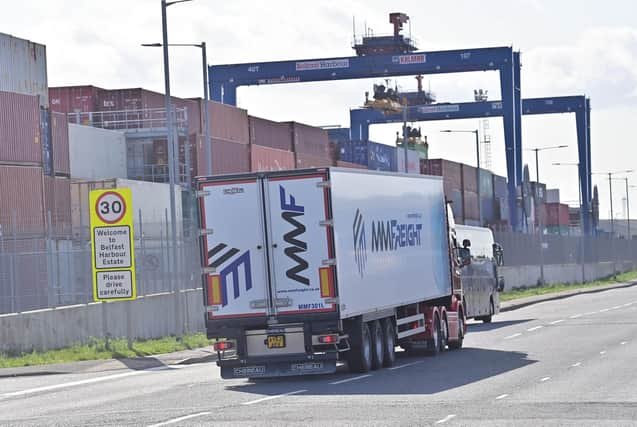Windsor Framework: ‘Fundamental reform’ needed to solve problems says economist Esmond Birnie


Professor Esmond Birnie from Ulster University says that – although he has not seen the ‘deal’ between the DUP and the government – some of the rumoured elements won’t be enough to deal with problems the Northern Irish economy is facing as a result of the current Windsor Framework.
There have been media reports that part of the deal includes a renaming of the Green Lane. Mr Birnie said if that is true, “by itself is meaningless, the key question is what proportion of GB to NI goods traffic is eligible to apply to use that lane, whatever it might be called”.
Advertisement
Advertisement
Other reports have suggested that the green lane could be removed entirely, or that there are significant reductions in checks.
“In business terms the bad consequence of an Irish Sea Border is the ‘friction’ it creates against bringing in GB origin goods to NI. Economists call this a ‘non tariff barrier’ – the bureaucracy, inconvenience, time delay introduced is equivalent to imposing a certain level of tax on GB goods coming into NI. Like others concerned with the business aspects I will be looking at the contents of the deal to see how far such frictions are reduced. To the extent that frictions remain in the ‘reformed Windsor Framework’ then a number of bad consequences follow in economic terms”, Professor Birnie said.
He says these include raised prices to consumers, reduced choice, a lower flow of goods from Great Britain to Northern Ireland and diversion of trade – whereby NI customers are forced to switch from GB suppliers to Rep ublic of Ireland / EU ones.
He argues that under the Windsor Framework only goods for ‘end use/final sale’ are eligible to be considered for the Green Lane.
Advertisement
Advertisement
"This means raw materials and components coming from GB for our manufacturing sector are excluded at the outset. I see no indications that the EU has moved on this point”, he said.
He is concerned that any easements provided in a deal between the DUP and the government won’t change the situation radically enough.
“Even if firms are eligible for the Green Lane it is not costless or without difficulty to actually use it (firms need to provide information about the country of origin of their products). Some people in business have said the Green Lane is really a Brown Lane – ie mix of green and red. Perhaps easements in the package will help but I fear they will not radically change this situation”.
He is critical of commentary which suggests that because Northern Ireland is currently well integrated into the UK market that the Windsor Framework doesn’t create an all-Ireland economy.
Advertisement
Advertisement
He told the News Letter: “In recent days a number of commentators have suggested that we can perhaps afford to live with a somewhat hybrid economic status for NI because none of this need mean that we are in or will move into an "all island" economy with the RoI. I entirely accept that most of our trade linkages are with GB, that is precisely my point, NI is a UK regional economy. However, we should note that since 2020 NI trade with RoI has been growing much more quickly than its trade with the rest of the UK. This certainly looks like trade diversion”.
The original NI Protocol was supposed to avoid trade diversion.
Locally, Stormont stands to gain around £3 billion if a deal is secured and Stormont is restored. Professor Birnie describes it as a “considerable” sum, but has concerns about whether it will result in a stable and sustainable financial landscape for Northern Ireland.
He said: “A wall of money may pass through the system but what does Stormont do - particularly about public sector pay in two to three years time - when that bump to the cash has passed. MLAs may be itching to get back in and get the Executive operating but they need to recognise that there will be an imperative from Day One to engage in public sector reform and productivity improvements on a scale we've never seen before. This will need massive amounts of political capability and courage."